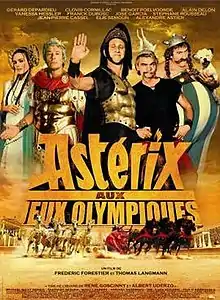Asterix at the Olympic Games (film)
Asterix at the Olympic Games (French: Astérix aux Jeux olympiques) is a 2008 French fantasy comedy film co–directed by Frédéric Forestier and Thomas Langmann, and written by Langmann, Alexandre Charlot and Frank Magnier, based on characters from René Goscinny and Albert Uderzo's Astérix comic series. It was filmed primarily in Spain throughout 2006.
| Astérix aux Jeux olympiques | |
|---|---|
 Theatrical release poster | |
| Directed by | |
| Produced by |
|
| Screenplay by |
|
| Based on | Asterix at the Olympic Games by René Goscinny |
| Starring | |
| Music by | Frédéric Talgorn |
| Cinematography | Thierry Arbogast |
| Edited by | |
Production companies |
|
| Distributed by | Pathé Distribution |
Release date |
|
Running time | 117 minutes[1] |
| Country |
|
| Language | French |
| Budget | $113.5 million[2] |
| Box office | $133 million[2] |
At the time of release, it was the most expensive French and non English-speaking film of all time.[3] The film was negatively received by critics, but performed well at several European box offices, topping charts in Poland, Spain and France.[4]
Plot
Astérix and Obélix must win the Olympic Games in order to help their friend Lovesix (Stéphane Rousseau) marry Princess Irina (portrayed by Vanessa Hessler). Brutus (Benoît Poelvoorde) uses every trick in the book to have his own team win the game, and get rid of his father Julius Caesar (Alain Delon) in the process.
The film is loosely adapted from the original Asterix at the Olympic Games comic book. The love story subplot between Lovesick and Irina was not featured in the original story. Brutus, portrayed here as a comical villain with no relation to his depictions in Asterix comics, is the main antagonist, although he was not even featured as a character in the original comic book.
Cast
- Gérard Depardieu as Obélix
- Clovis Cornillac as Astérix
- Benoît Poelvoorde as Brutus
- Jean-Pierre Cassel as the Druid Panoramix
- Alain Delon as Julius Caesar
- Bouli Lanners as Samagas
- Jean-Pierre Castaldi as Castaldus
- Dorothée Jemma as Bonemine
- Santiago Segura as Docteurmabus
- Vanessa Hessler as Princess Irina
- Stéphane Rousseau as Lovesix
- José Garcia as Couverdepus
- Vincent Moscato as Goth
There is a cameo of Adriana Karembeu as Mrs Geriatrix and Jamel Debbouze reprises his role as Numerobis. German comedy star and director Michael Bully Herbig has a bit-part as a mute Roman soldier. Italian comedy actor Enrico Brignano appears as a reporter.
The film featured several cameos by real-life sports stars, such as Michael Schumacher, Jean Todt, Zinedine Zidane, Tony Parker and Amélie Mauresmo. The part of Roman athlete Claudius Cornedurus (Gluteus Maximus), played by Jérôme Le Banner, was originally to be played by Jean-Claude Van Damme.[5]
Production
Filming took place in Alicante (including the Ciudad de la Luz studio),[6] Spain and lasted six months.
Box office
The film grossed $23.4 million in France in its opening weekend, which was more than 60% of its gross in 19 territories in which the film was released. Box Office Mojo estimated $38.7 million in revenue within a week after the film was released.[7]
References
- "Astérix aux Jeux Olympiques - Astérix at the Olympic Games (PG)". British Board of Film Classification. 28 January 2008. Retrieved 8 October 2016.
- "Astérix aux Jeux Olympiques".
- Cendrowicz, Leo (31 January 2008). "Asterix Aims to Conquer Europe". TIME Magazine. Archived from the original on 1 February 2008. Retrieved 31 January 2008.
- "News : Alain Delon et Jean-Claude Van Damme dans "Astérix 3" !". Allocine.fr. Archived from the original on 28 July 2009. Retrieved 31 December 2010.
- Beltran, Adolf; Bono, Ferran (7 June 2014). "Lights go out on Alicante movie studios". El País.
- "Around the World Roundup: 'Asterix' Leaps to the Top". Box Office Mojo. 10 February 2008. Retrieved 31 December 2010.